The Coalition's Policy for Healthy Life, Better Ageing: Analysis
VerifiedAdded on 2021/02/19
|10
|1289
|162
Report
AI Summary
This report provides an in-depth analysis of the Coalition's policy for healthy life and better ageing in Australia. It begins by outlining the purpose, which is to improve the quality of life for older citizens by ensuring access to necessary services. The background highlights the challenges faced by the ageing population, including emotional, psychological, and physical changes, and the need for government intervention. Key terms such as social policies, chronic diseases, and palliative care are defined. The main body discusses the difficulties old people face due to health issues and limited access to healthcare, and the coalition's policy aims to provide dignified care, support, and flexible living arrangements. Findings reveal the importance of addressing financial, pharmacy, and palliative services, as well as the need to simplify complex procedures. The report concludes by emphasizing the significance of implementing policies to support the needs of the elderly and raise community awareness. References include various books and journals related to the topic.
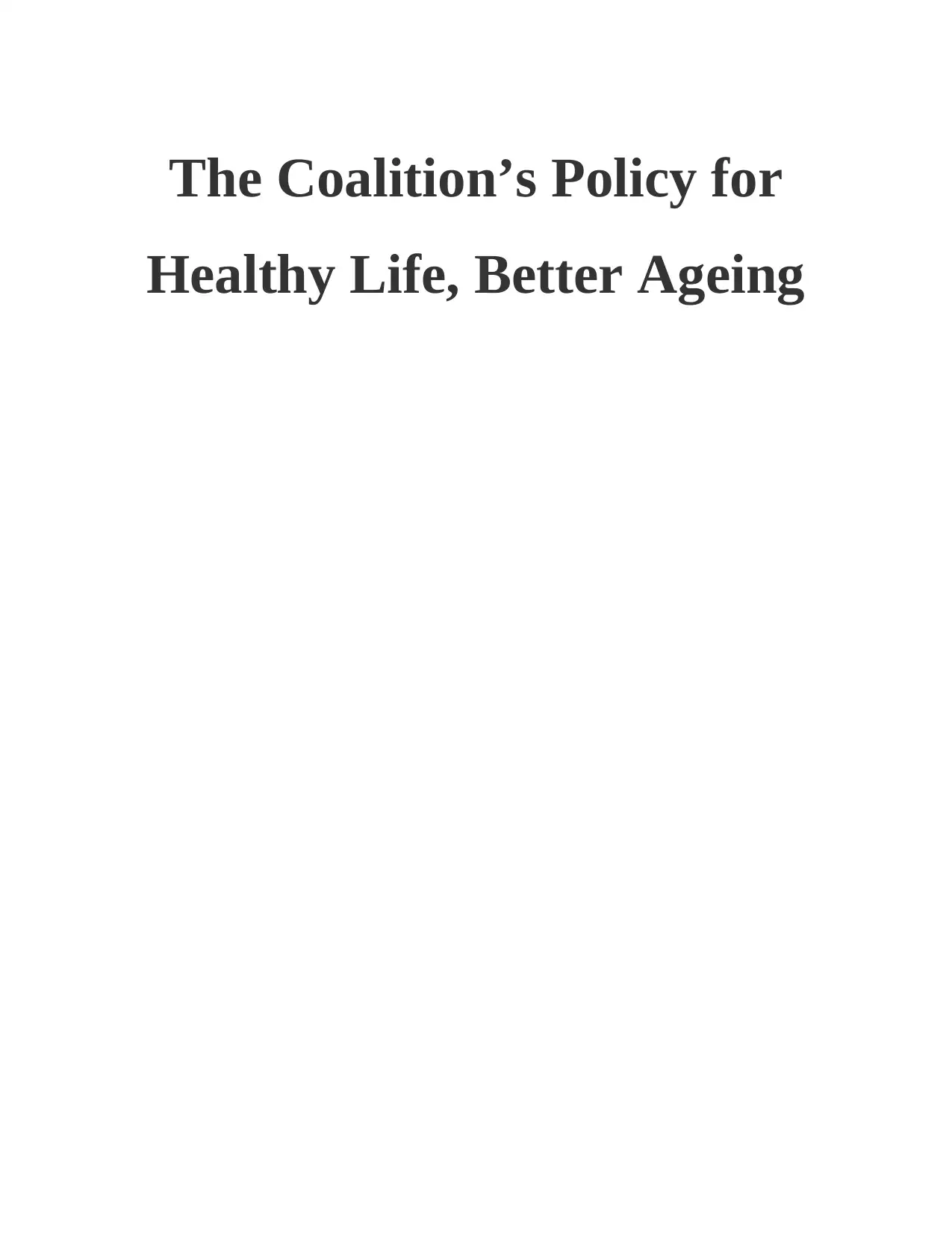
The Coalition’s Policy for
Healthy Life, Better Ageing
Healthy Life, Better Ageing
Paraphrase This Document
Need a fresh take? Get an instant paraphrase of this document with our AI Paraphraser
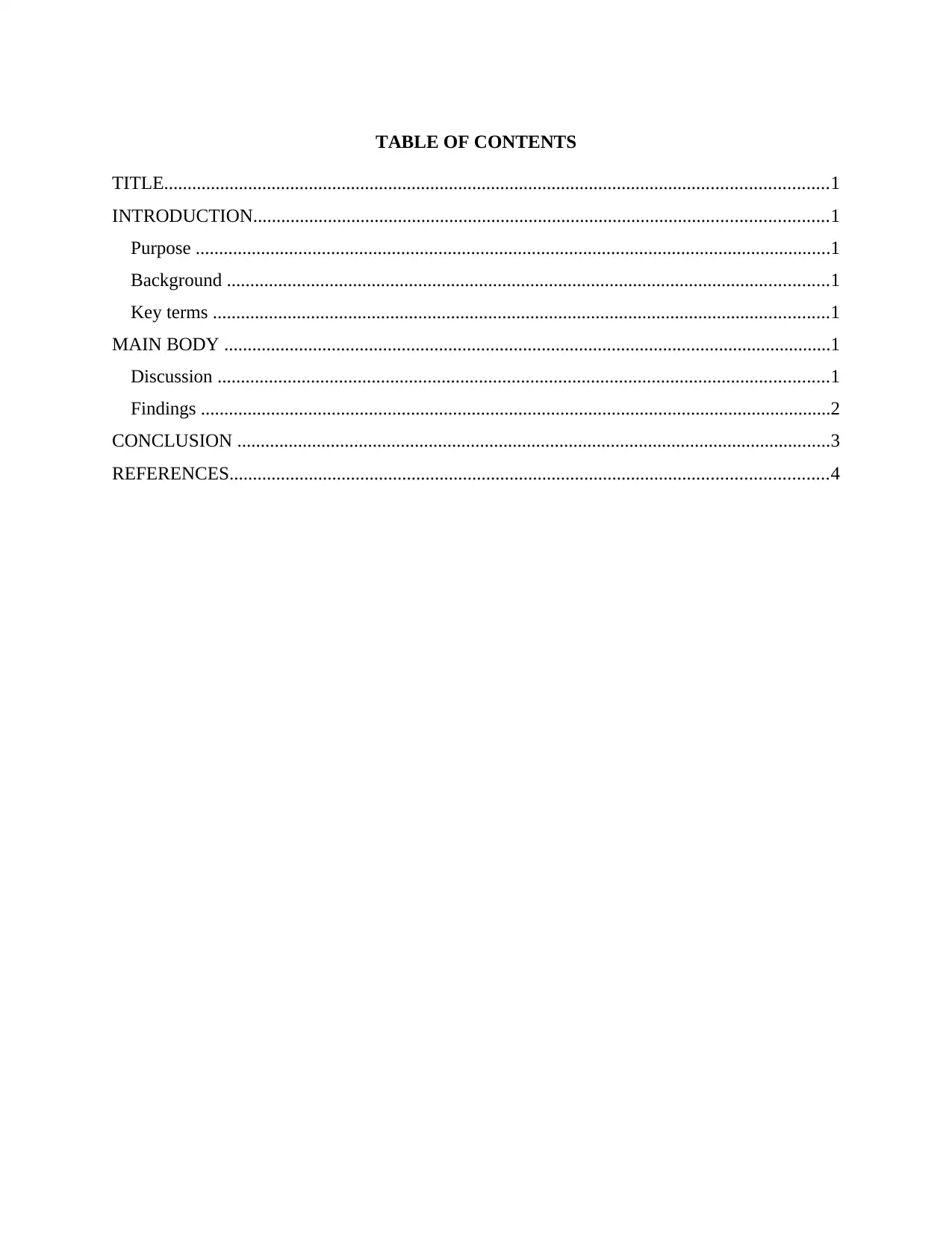
TABLE OF CONTENTS
TITLE..............................................................................................................................................1
INTRODUCTION...........................................................................................................................1
Purpose ........................................................................................................................................1
Background .................................................................................................................................1
Key terms ....................................................................................................................................1
MAIN BODY ..................................................................................................................................1
Discussion ...................................................................................................................................1
Findings .......................................................................................................................................2
CONCLUSION ...............................................................................................................................3
REFERENCES................................................................................................................................4
TITLE..............................................................................................................................................1
INTRODUCTION...........................................................................................................................1
Purpose ........................................................................................................................................1
Background .................................................................................................................................1
Key terms ....................................................................................................................................1
MAIN BODY ..................................................................................................................................1
Discussion ...................................................................................................................................1
Findings .......................................................................................................................................2
CONCLUSION ...............................................................................................................................3
REFERENCES................................................................................................................................4
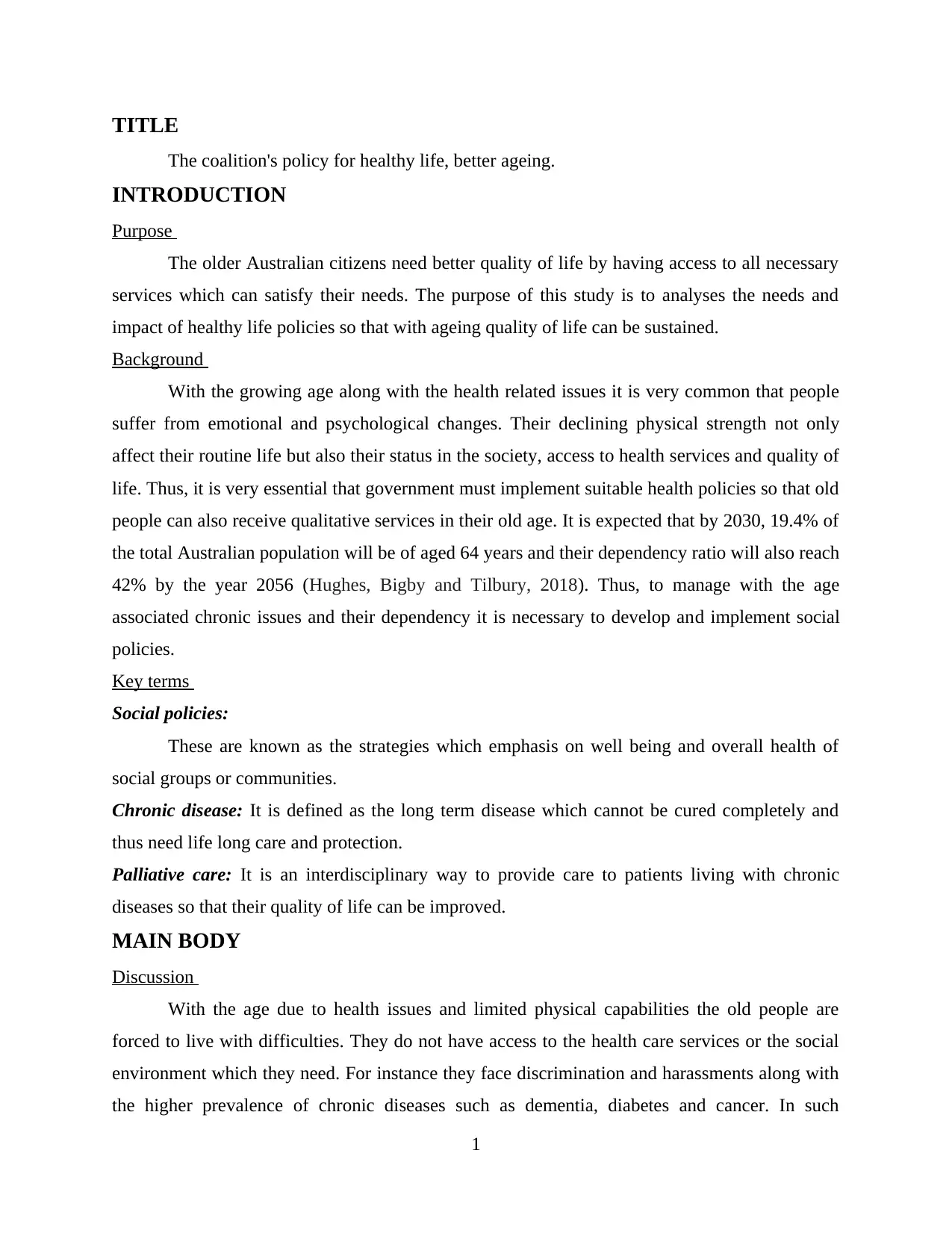
TITLE
The coalition's policy for healthy life, better ageing.
INTRODUCTION
Purpose
The older Australian citizens need better quality of life by having access to all necessary
services which can satisfy their needs. The purpose of this study is to analyses the needs and
impact of healthy life policies so that with ageing quality of life can be sustained.
Background
With the growing age along with the health related issues it is very common that people
suffer from emotional and psychological changes. Their declining physical strength not only
affect their routine life but also their status in the society, access to health services and quality of
life. Thus, it is very essential that government must implement suitable health policies so that old
people can also receive qualitative services in their old age. It is expected that by 2030, 19.4% of
the total Australian population will be of aged 64 years and their dependency ratio will also reach
42% by the year 2056 (Hughes, Bigby and Tilbury, 2018). Thus, to manage with the age
associated chronic issues and their dependency it is necessary to develop and implement social
policies.
Key terms
Social policies:
These are known as the strategies which emphasis on well being and overall health of
social groups or communities.
Chronic disease: It is defined as the long term disease which cannot be cured completely and
thus need life long care and protection.
Palliative care: It is an interdisciplinary way to provide care to patients living with chronic
diseases so that their quality of life can be improved.
MAIN BODY
Discussion
With the age due to health issues and limited physical capabilities the old people are
forced to live with difficulties. They do not have access to the health care services or the social
environment which they need. For instance they face discrimination and harassments along with
the higher prevalence of chronic diseases such as dementia, diabetes and cancer. In such
1
The coalition's policy for healthy life, better ageing.
INTRODUCTION
Purpose
The older Australian citizens need better quality of life by having access to all necessary
services which can satisfy their needs. The purpose of this study is to analyses the needs and
impact of healthy life policies so that with ageing quality of life can be sustained.
Background
With the growing age along with the health related issues it is very common that people
suffer from emotional and psychological changes. Their declining physical strength not only
affect their routine life but also their status in the society, access to health services and quality of
life. Thus, it is very essential that government must implement suitable health policies so that old
people can also receive qualitative services in their old age. It is expected that by 2030, 19.4% of
the total Australian population will be of aged 64 years and their dependency ratio will also reach
42% by the year 2056 (Hughes, Bigby and Tilbury, 2018). Thus, to manage with the age
associated chronic issues and their dependency it is necessary to develop and implement social
policies.
Key terms
Social policies:
These are known as the strategies which emphasis on well being and overall health of
social groups or communities.
Chronic disease: It is defined as the long term disease which cannot be cured completely and
thus need life long care and protection.
Palliative care: It is an interdisciplinary way to provide care to patients living with chronic
diseases so that their quality of life can be improved.
MAIN BODY
Discussion
With the age due to health issues and limited physical capabilities the old people are
forced to live with difficulties. They do not have access to the health care services or the social
environment which they need. For instance they face discrimination and harassments along with
the higher prevalence of chronic diseases such as dementia, diabetes and cancer. In such
1
⊘ This is a preview!⊘
Do you want full access?
Subscribe today to unlock all pages.

Trusted by 1+ million students worldwide
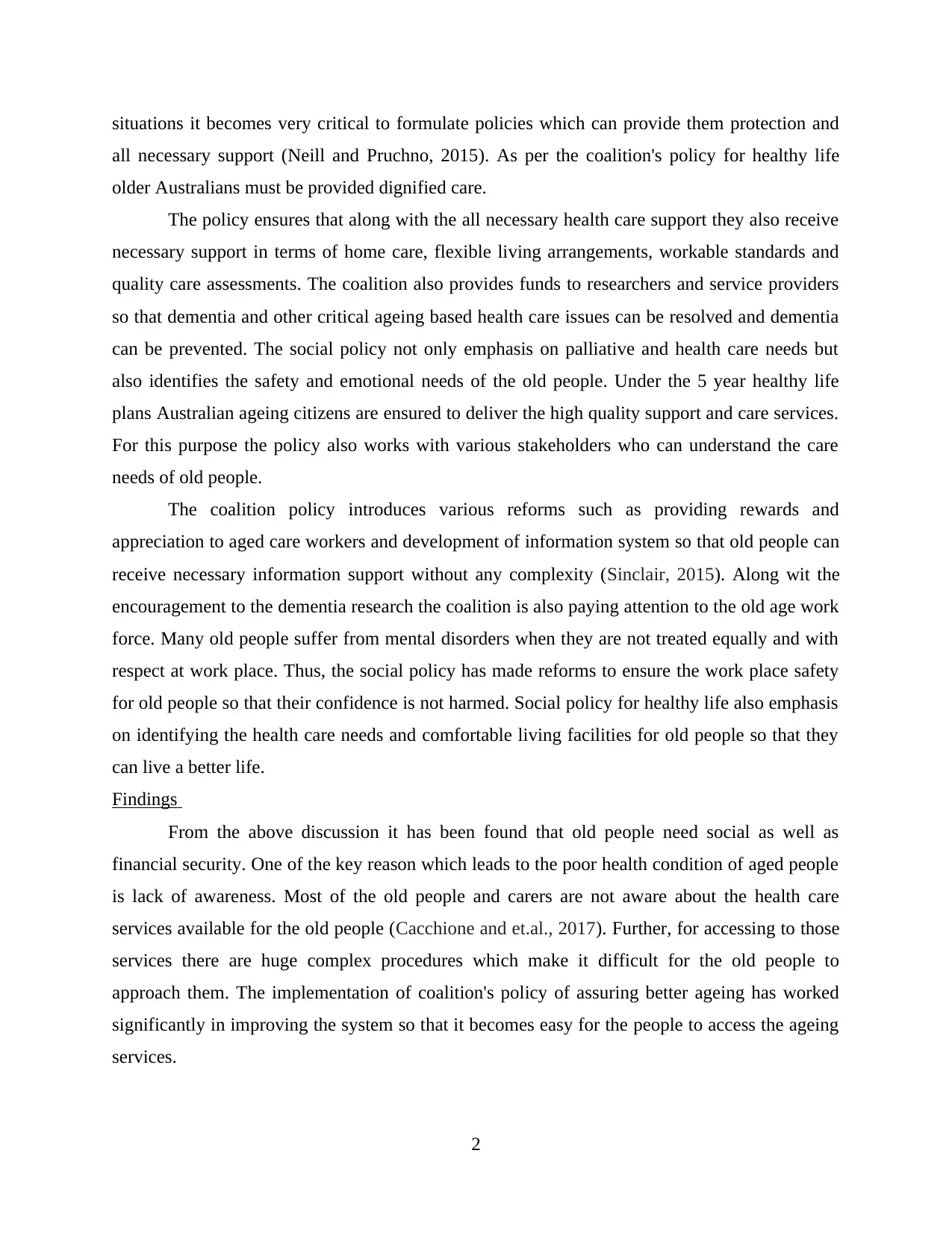
situations it becomes very critical to formulate policies which can provide them protection and
all necessary support (Neill and Pruchno, 2015). As per the coalition's policy for healthy life
older Australians must be provided dignified care.
The policy ensures that along with the all necessary health care support they also receive
necessary support in terms of home care, flexible living arrangements, workable standards and
quality care assessments. The coalition also provides funds to researchers and service providers
so that dementia and other critical ageing based health care issues can be resolved and dementia
can be prevented. The social policy not only emphasis on palliative and health care needs but
also identifies the safety and emotional needs of the old people. Under the 5 year healthy life
plans Australian ageing citizens are ensured to deliver the high quality support and care services.
For this purpose the policy also works with various stakeholders who can understand the care
needs of old people.
The coalition policy introduces various reforms such as providing rewards and
appreciation to aged care workers and development of information system so that old people can
receive necessary information support without any complexity (Sinclair, 2015). Along wit the
encouragement to the dementia research the coalition is also paying attention to the old age work
force. Many old people suffer from mental disorders when they are not treated equally and with
respect at work place. Thus, the social policy has made reforms to ensure the work place safety
for old people so that their confidence is not harmed. Social policy for healthy life also emphasis
on identifying the health care needs and comfortable living facilities for old people so that they
can live a better life.
Findings
From the above discussion it has been found that old people need social as well as
financial security. One of the key reason which leads to the poor health condition of aged people
is lack of awareness. Most of the old people and carers are not aware about the health care
services available for the old people (Cacchione and et.al., 2017). Further, for accessing to those
services there are huge complex procedures which make it difficult for the old people to
approach them. The implementation of coalition's policy of assuring better ageing has worked
significantly in improving the system so that it becomes easy for the people to access the ageing
services.
2
all necessary support (Neill and Pruchno, 2015). As per the coalition's policy for healthy life
older Australians must be provided dignified care.
The policy ensures that along with the all necessary health care support they also receive
necessary support in terms of home care, flexible living arrangements, workable standards and
quality care assessments. The coalition also provides funds to researchers and service providers
so that dementia and other critical ageing based health care issues can be resolved and dementia
can be prevented. The social policy not only emphasis on palliative and health care needs but
also identifies the safety and emotional needs of the old people. Under the 5 year healthy life
plans Australian ageing citizens are ensured to deliver the high quality support and care services.
For this purpose the policy also works with various stakeholders who can understand the care
needs of old people.
The coalition policy introduces various reforms such as providing rewards and
appreciation to aged care workers and development of information system so that old people can
receive necessary information support without any complexity (Sinclair, 2015). Along wit the
encouragement to the dementia research the coalition is also paying attention to the old age work
force. Many old people suffer from mental disorders when they are not treated equally and with
respect at work place. Thus, the social policy has made reforms to ensure the work place safety
for old people so that their confidence is not harmed. Social policy for healthy life also emphasis
on identifying the health care needs and comfortable living facilities for old people so that they
can live a better life.
Findings
From the above discussion it has been found that old people need social as well as
financial security. One of the key reason which leads to the poor health condition of aged people
is lack of awareness. Most of the old people and carers are not aware about the health care
services available for the old people (Cacchione and et.al., 2017). Further, for accessing to those
services there are huge complex procedures which make it difficult for the old people to
approach them. The implementation of coalition's policy of assuring better ageing has worked
significantly in improving the system so that it becomes easy for the people to access the ageing
services.
2
Paraphrase This Document
Need a fresh take? Get an instant paraphrase of this document with our AI Paraphraser
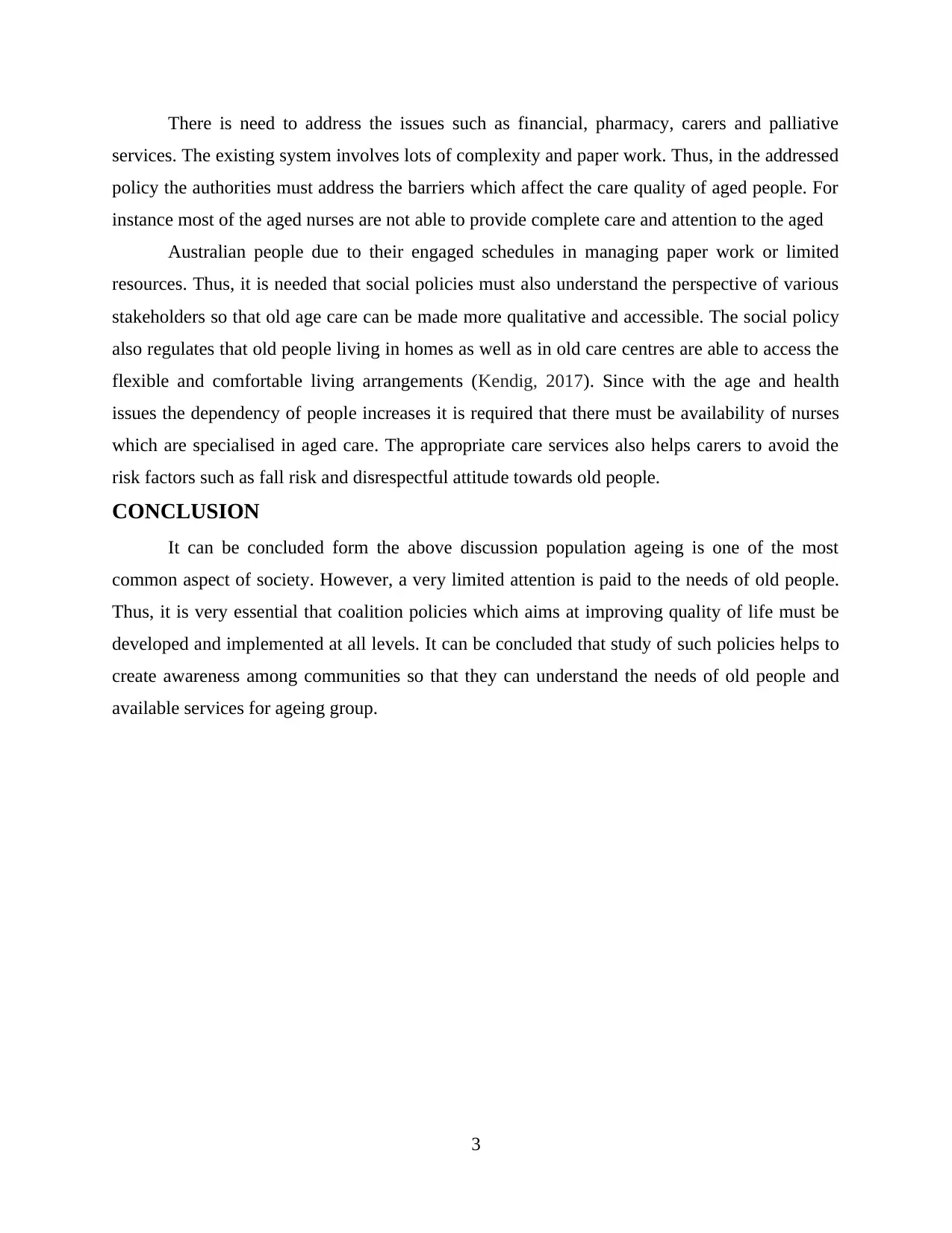
There is need to address the issues such as financial, pharmacy, carers and palliative
services. The existing system involves lots of complexity and paper work. Thus, in the addressed
policy the authorities must address the barriers which affect the care quality of aged people. For
instance most of the aged nurses are not able to provide complete care and attention to the aged
Australian people due to their engaged schedules in managing paper work or limited
resources. Thus, it is needed that social policies must also understand the perspective of various
stakeholders so that old age care can be made more qualitative and accessible. The social policy
also regulates that old people living in homes as well as in old care centres are able to access the
flexible and comfortable living arrangements (Kendig, 2017). Since with the age and health
issues the dependency of people increases it is required that there must be availability of nurses
which are specialised in aged care. The appropriate care services also helps carers to avoid the
risk factors such as fall risk and disrespectful attitude towards old people.
CONCLUSION
It can be concluded form the above discussion population ageing is one of the most
common aspect of society. However, a very limited attention is paid to the needs of old people.
Thus, it is very essential that coalition policies which aims at improving quality of life must be
developed and implemented at all levels. It can be concluded that study of such policies helps to
create awareness among communities so that they can understand the needs of old people and
available services for ageing group.
3
services. The existing system involves lots of complexity and paper work. Thus, in the addressed
policy the authorities must address the barriers which affect the care quality of aged people. For
instance most of the aged nurses are not able to provide complete care and attention to the aged
Australian people due to their engaged schedules in managing paper work or limited
resources. Thus, it is needed that social policies must also understand the perspective of various
stakeholders so that old age care can be made more qualitative and accessible. The social policy
also regulates that old people living in homes as well as in old care centres are able to access the
flexible and comfortable living arrangements (Kendig, 2017). Since with the age and health
issues the dependency of people increases it is required that there must be availability of nurses
which are specialised in aged care. The appropriate care services also helps carers to avoid the
risk factors such as fall risk and disrespectful attitude towards old people.
CONCLUSION
It can be concluded form the above discussion population ageing is one of the most
common aspect of society. However, a very limited attention is paid to the needs of old people.
Thus, it is very essential that coalition policies which aims at improving quality of life must be
developed and implemented at all levels. It can be concluded that study of such policies helps to
create awareness among communities so that they can understand the needs of old people and
available services for ageing group.
3
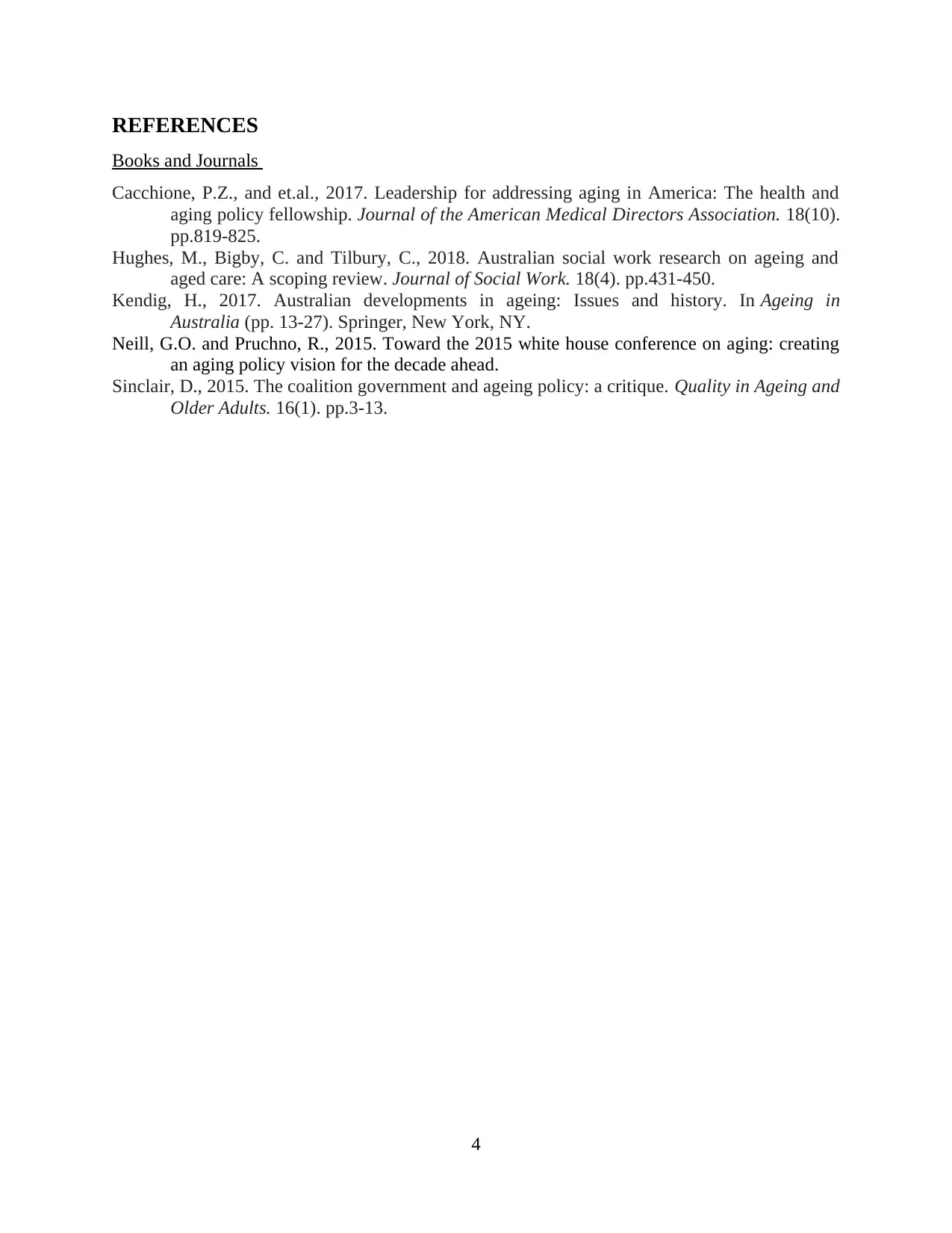
REFERENCES
Books and Journals
Cacchione, P.Z., and et.al., 2017. Leadership for addressing aging in America: The health and
aging policy fellowship. Journal of the American Medical Directors Association. 18(10).
pp.819-825.
Hughes, M., Bigby, C. and Tilbury, C., 2018. Australian social work research on ageing and
aged care: A scoping review. Journal of Social Work. 18(4). pp.431-450.
Kendig, H., 2017. Australian developments in ageing: Issues and history. In Ageing in
Australia (pp. 13-27). Springer, New York, NY.
Neill, G.O. and Pruchno, R., 2015. Toward the 2015 white house conference on aging: creating
an aging policy vision for the decade ahead.
Sinclair, D., 2015. The coalition government and ageing policy: a critique. Quality in Ageing and
Older Adults. 16(1). pp.3-13.
4
Books and Journals
Cacchione, P.Z., and et.al., 2017. Leadership for addressing aging in America: The health and
aging policy fellowship. Journal of the American Medical Directors Association. 18(10).
pp.819-825.
Hughes, M., Bigby, C. and Tilbury, C., 2018. Australian social work research on ageing and
aged care: A scoping review. Journal of Social Work. 18(4). pp.431-450.
Kendig, H., 2017. Australian developments in ageing: Issues and history. In Ageing in
Australia (pp. 13-27). Springer, New York, NY.
Neill, G.O. and Pruchno, R., 2015. Toward the 2015 white house conference on aging: creating
an aging policy vision for the decade ahead.
Sinclair, D., 2015. The coalition government and ageing policy: a critique. Quality in Ageing and
Older Adults. 16(1). pp.3-13.
4
⊘ This is a preview!⊘
Do you want full access?
Subscribe today to unlock all pages.

Trusted by 1+ million students worldwide

5
Paraphrase This Document
Need a fresh take? Get an instant paraphrase of this document with our AI Paraphraser

6

7
⊘ This is a preview!⊘
Do you want full access?
Subscribe today to unlock all pages.

Trusted by 1+ million students worldwide

8
1 out of 10
Related Documents
Your All-in-One AI-Powered Toolkit for Academic Success.
+13062052269
info@desklib.com
Available 24*7 on WhatsApp / Email
![[object Object]](/_next/static/media/star-bottom.7253800d.svg)
Unlock your academic potential
Copyright © 2020–2026 A2Z Services. All Rights Reserved. Developed and managed by ZUCOL.





